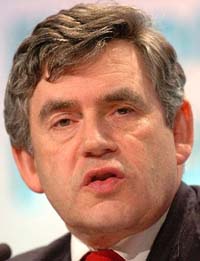Gordon Brown aiming to lead new drive on stalled global development plan
British Prime Minister Gordon Brown was aiming to build new international alliances for a fight against global poverty Tuesday, using a United Nations speech to press nations, businesses and individuals to back ambitious plans to revive a stalled global development plan.

His call for a push on aid and diplomacy followed a two-day summit with U.S. President George W. Bush, where the new British chief pledged support for military action in Iraq and Afghanistan and tough measures to tackle terrorism.
British officials have insisted Brown's foreign policy will be marked by his desire to mix the use of force and sanctions with backing for development and economic aid programs. Brown has called it a balance of "hard power and soft power."
His attempts to lead the international community in efforts to break an impasse on stalled world trade negotiations and on halting violence in Sudan's Darfur region are read by some as a bid to atone for predecessor Tony Blair's unpopular backing for the U.S.-led invasion of Iraq.
Officials said Brown hopes to harness the popular global support won by campaigns such as Make Poverty History and Live Earth to support his development drive.
In a speech to the U.N. on Tuesday, Brown planned to press an audience of business leaders, non-governmental organizations and international delegates over failures in meeting the Millennium Development Goals.
A report card published earlier this month showed that progress toward achieving the benchmarks on reducing global poverty and increasing access to childcare and education, agreed to at a U.N. summit in 2000, was poor, Brown's aides said.
Brown has held talks with U2 singer and anti-poverty campaigner Bono about the goals and plans to enlist businesses, including Google and Wal-Mart, to help governments achieve the development goals, British officials said.
Speaking to reporters at New York's Waldorf-Astoria hotel, Brown said he would also demand backing for efforts to authorize a 26,000-strong combined U.N.-African peacekeeping force for Darfur.
The leader's Downing Street office said Brown hoped initial troops could be deployed by October in an attempt to halt the fighting between ethnic African rebels and the pro-government janjaweed Arab militia in the western Sudanese region.
U.S. ambassador to the United Nations, Zalmay Khalilzad, said Monday that Security Council members hoped to finalize a resolution within 24 hours.
Former President Bill Clinton held brief discussions with the British leader at the Waldorf-Astoria Hotel on Monday evening about his U.N. speech and work to helping developing nations, Brown told reporters.
Brown was due to appear on NBC television's "Today" show on Tuesday morning and meet with U.N. Secretary General Ban Ki-moon.
Reginald Dale, a senior fellow at the Washington-based Center for Strategic and International Studies, said the British leader's decision to meet Bush and Ban on the same visit had caused some disquiet.
"They are angered that his visit is a twofer," Dale said. "Some Republicans believe Brown has deliberately gone to the U.N. to attempt to draw the sting out of meeting Bush for his domestic audience."
Talks Sunday and Monday at Bush's Camp David retreat in Maryland saw the British and U.S. leaders pledge harmony over Iraq.
"There's no doubt in my mind he understands the stakes of the struggle," Bush said, heaping praise on Blair's successor.
Subscribe to Pravda.Ru Telegram channel, Facebook, RSS!


